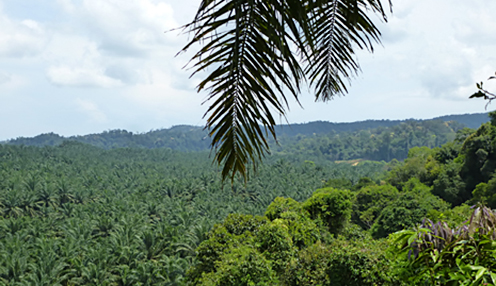New project sheds light on the impact of European consumers on land use elsewhere in the world
One of the key challenges faced in the 21st century is to ensure that the land is used in a sustainable way, and it is difficult in a globalised world because demand in one region has an impact on land use in other parts of the world. The Department of Geosciences and Natural Resource Management at the University of Copenhagen is participating in a European project that seeks to unravel these complicated links.

Palm oil plantation (left) and national park with tropical forest (right). Photo: Thilde Bech Bruun, Department of Geosciences and Natural Resource Management
Palm oil is a prime example of how demand in Europe affects land use in Asia via complex, almost opaque processes, making it difficult to guarantee that the oil palms are cultivated in in a sustainable way. The same problem applies to many other products. Researchers from the Department, together with seven other European universities and 12 public- and private-sector organisations, have received funding of €3.7 million to unravel these complicated links. The money comes from Horizon 2020, the EU Framework Programme for Research and Innovation.
Increasing demand for palm oil
Europeans are eating more and more processed food, which often has a very high palm oil content. The oil is also used to an increasing extent in industrial products such as shampoo, detergent and biodiesel. One effect of the increasing demand is that the area used for oil palms in Indonesia tripled between 2006 and 2017 and now accounts for a total of 12 million hectares – the combined size of Denmark, Switzerland and the Netherlands – most of which used to be covered by tropical rainforest.
“Demand for certified palm oil in Europe is on the rise, partly to prevent deforestation due to new plantations,” explains Associate Professor Thilde Bech Bruun.
“Certification has an effect on how plantations are established and managed, e.g. in Malaysia and Indonesia, which together account for 85% of global palm oil production. But it’s really difficult to determine the actual effect of certification at local level. All sorts of other processes are also at play, and trading of the product takes place in complex networks. For example, we are now witnessing a significant increase in demand for non-certified palm oil from Russia.”
Links between local and global
The purpose of the COUPLED project is to develop a new analytical framework that links local developments with global trends. It compares studies of local conditions in the countries that produce products such as palm oil, with analyses that follow the money, consumer demand, decisions, political demands, etc. in both directions. This makes it possible to involve methods from many different disciplines such as geography, ecology, economics and anthropology.
The core of the project consists of 15 PhD projects at the eight partner universities, two of them at the Department of Geosciences and Natural Resource Management. The students will deliver new analytical tools and a new understanding of how globalised socio-ecological systems function. The projects will also identify where and how private and public-sector organisations can work together to make sustainable decisions.
About the project
The project COUPLED: Operationalising Telecoupling for Solving Sustainability Challenges for Land Use starts in January 2018. Associate Professor Thilde Bech Bruun and Professor Ole Mertz will supervise two PhD students at the Department of Geosciences and Natural Resource Management. The supervision will take place in close collaboration with the other seven universities, international companies and institutions.
The European Commission’s Horizon 2020 Marie Sklodowska-Curie Research and Innovation Programme is funding the project. The coordinator is Professor Jonas Østergaard Nielsen at the Humboldt University in Berlin.
Contact
Associate Professor Thilde Bech Bruun
Tel.: +45 35 33 34 12
E-mail: thbb@ign.ku.dk
Anette Bill-Jessen
Communication Coordinator:
Tel.: +45 93 51 13 70
E-mail: anbj@ign.ku.dk
